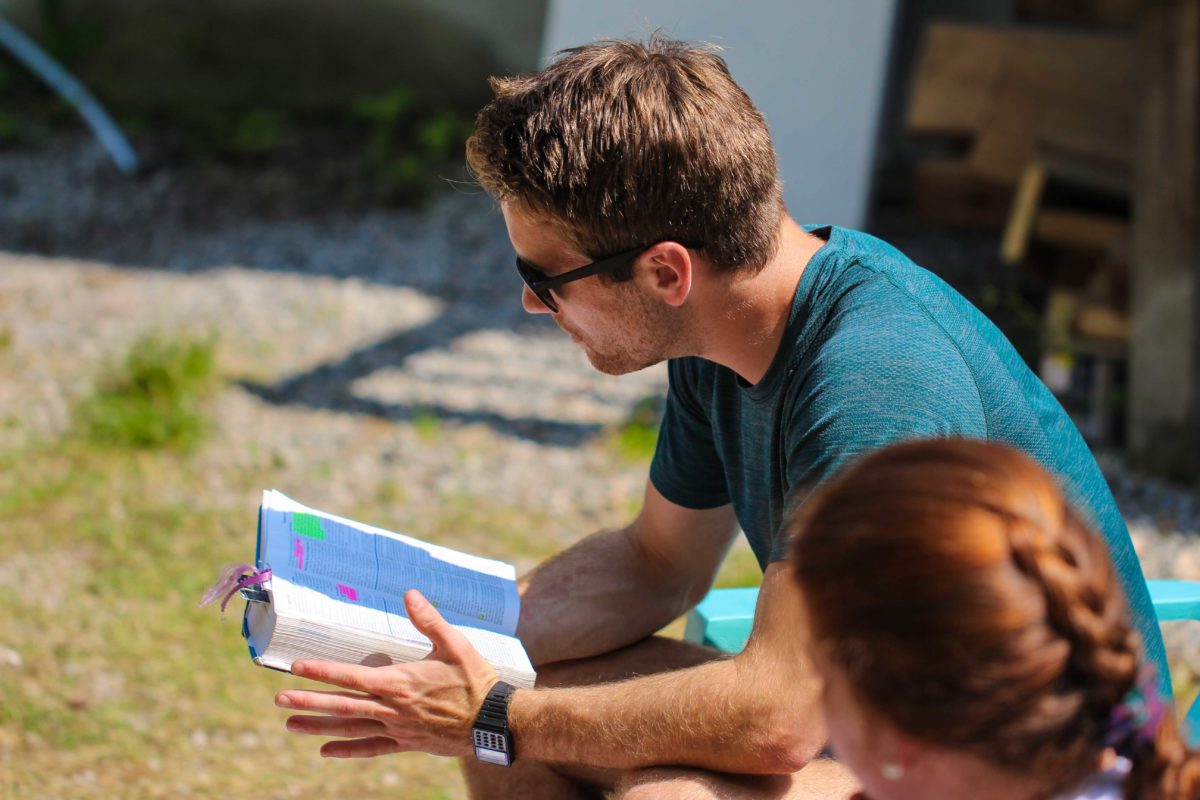**We are launching online bible studies. Sign up here**
Hello! Hello!
As we enter February and get ready to wrap up our series on studying the Bible I want to encourage you to think about what you are doing this summer. Have you filled out an application to join our summer team? You should right now!
With your summer plans in order, let’s talk about the last part of studying the Bible. We talked about “why” in week 1 and about “how” in week 2 but now we are going to turn our attention to what you can do to reach the next level. Here are five ways to go further in your Bible Study:
1. Journal
Let’s start with a confession. When I read the Bible I sometimes treat it like a chore. It’s a task that I have to complete. It’s all about getting it done, checking the box, and moving on. But studying, intentionally spending time in God’s word to learn, requires more attention than that. To help, I recommend keeping a journal. Write down your thoughts, your questions, your ideas, your inspiration. Over time you will find that you have collected a wealth of insight.
Here are a few ways you can organize your journaling:
- Themes – listing a few key themes for a passage at the top of a page will help you refer back later
- Verses – that you are reminded of – if you see a connection between a passage and another passage write it down
- Names – list the characters and track their story
2. Read the Bible in Parallel
There are many translations of the bible. There is a reason for this wealth of options: ancient languages are complex and don’t make the leap into English all that well at times. Most of us don’t have time to learn ancient greek or Hebrew but you can begin to grasp some of the nuances of a text’s translation by looking at the passage in more than one translation. It’s actually really easy to do with online tools.
You may not know this but biblegateway.com has a feature that allows you to load more than one translation at a time. If you load up your passage at the top of the passage you will see the drop-down tab to change the translation. Look to the right of that and you’ll see four buttons (one for sharing, one for printing, one for settings and one for adding parallels). The “add parallels” button looks kinda like two combs back to back. Press it and you now have the ability to add a second translation to the same page side-by-side.
Some recommended versions (a non-exhaustive list no particular order):
- English Standard Version (ESV)
- New International Version or Today’s New International Version (NIV or TNIV)
- New Revised Standard Version (NRSV)
- New International Readers Version (NIRV) *this is the one we use with campers.
- The Message
3. Read Along with a Commentary
People have already done a lot of complicated work of studying the Bible. They write down their thoughts and observations in commentaries. As you study, you can read along with a commentary of your choosing and use their writing to help you understand the Bible. But how do you find a good commentary (cause there are a lot of commentaries out there):
- Ask someone you trust.
- Do some research online (read reviews)
- As a good starting place, I recommend N.T. Wright’s New Testament for Everyone series. N. T. Wright offers a good understanding of a text while also linking it to the contemporary world.
4. Join a Bible Study
At church, at school, or at home you can probably find a preexisting bible study group. These groups are an amazing way of studying because you get insight from your group leader (who plans your study) and from the rest of the group (who participate in the study). Studying with others is a great way of getting into the Bible.
We are launching online bible study groups in March. Sign up here to get information about it and to have your schedule taken into account.
5. Plan for Big Questions
Studying will inevitably lead us to big questions and even with good notes, various translations, commentaries, and having a bible study group you will eventually hit on important questions you can’t answer. Having a plan for what to do with them is important.
- Know who to ask: there are plenty of people you can ask: pastors, mentors, and leaders in your life are just a few.
- Know where to look: when you hit a big question you may need to start studying the answer. Find books on the subject, research people’s thoughts online, join a discussion group.
- Know that not knowing is a possibility and that’s ok: you may not get the answer you want or a clear answer at all. That sucks but it is a part of studying. There are parts of our faith that are less clear or harder to pin down. These mysteries are worth pondering and questioning and exploring but you may have to eventually choose to accept the non-answers on faith. Hebrews 11 says it well: “Now faith is confidence in what we hope for and assurance about what we do not see.” Notice it isn’t about blind obedience or wishful thinking. In this case, we have hope in what we do not yet know or understand. That hope is founded on what comes next in Hebrews 11. Example after example of faith in God and God’s faithful action. We cannot know everything about the future but looking back we see that God has been faithful to his people and so we can confidently expect he will be faithful to us.
Reading, studying, and learning from the Bible is a long journey. You will likely never finish learning from the Bible and that’s ok. In fact, it’s amazing to think that you have access to a book that will shape your life and continually teach you about who God is and what he is doing in this world. We want to support you as you learn and grow. You can reach Michelle at any time by email at michelle@miniyowe.com.
What would a year of serious studying of scripture mean for your life? How would you be shaped? How would you grow? The only way to find out is to do it. I believe you can do it. And to help for the next four weeks we are going to be doing some audio bible study together and study the whole book of Philippians. So if you want a head start I encourage you to start reading Philippians 1. And in the meantime, keep being awesome.
This post is part of our Leap of Faith Audio Check-ins. We want to encourage you to leap into your faith and continue to grow at home, at school, and in your church. These audio check-ins are meant to encourage you as live out your faith every day.
Want to keep growing?
There are more episode of Leap of Faith and other resources for you to grow in your leadership and faith here.

